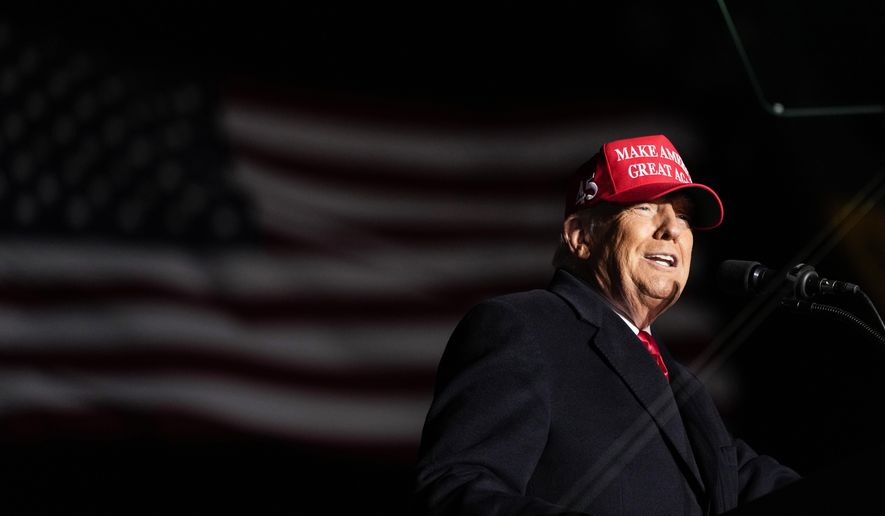The worst political attacks on Republicans who join the 2024 presidential field likely won’t come from Democrats. Instead, they will be lobbed by former President Donald Trump, whose command over much of the party’s base will make it difficult for his opponents to fire back without the risk of alienating MAGA voters.
Florida Gov. Ron DeSantis, a top Trump target, is leading the emerging field of 2024 Republicans with a strategy to deal with Mr. Trump: Ignore the former president’s attacks and avoid mentioning him by name.
Other Republicans are following the DeSantis playbook, and Republican strategists say the approach is smart — at least for now.
“[Mr. DeSantis] doesn’t want the direct engagements,” said former Rep. David Jolly, a Republican strategist based in Florida. “It doesn’t help him, and he’s been able to get where he is today without it.”
Mr. DeSantis is by far the most popular Republican primary candidate other than Mr. Trump, and he is outperforming the former president in one-on-one matchups in several polls.
Yet Mr. DeSantis isn’t the only rising Republican star whom the former president has targeted.
Mr. Trump has taken swipes at former Vice President Mike Pence; his former U.N. ambassador, Nikki Haley; his former secretary of state, Mike Pompeo; and Virginia Gov. Glenn Youngkin.
In her campaign kickoff Wednesday in Charleston, South Carolina, Mrs. Haley made an appeal to Republican voters who are “tired of losing.” It was seen as barb at Mr. Trump.
The former president’s spokesperson called Mrs. Haley “a career politician whose only fulfilled commitment is to herself.”
The Trump campaign issued a statement saying “the real Nikki Haley” admires Hillary Clinton and supports cuts to entitlement programs.
Mr. Trump, on the defensive after disappointing midterm election results, lashed out at Mr. Youngkin in November. He said the popular governor, who defied the odds with his 2021 victory, “couldn’t have won” without his endorsement and suggested that his name “sounds Chinese.”
Like Mr. DeSantis, Mr. Youngkin did not punch back. He told reporters in Richmond that he had not seen Mr. Trump’s comments.
“You all know me. I do not call people names,” Mr. Youngkin said. “That’s not the way I roll and not the way I behave. This is a moment for us to come together as a nation.”
So far, neither Mr. Pompeo nor Mrs. Haley has responded to Mr. Trump’s jabs. Mrs. Haley did call for cognitive tests for candidates older than 75. Mr. Trump is 76, and President Biden is 80.
Mr. Trump said this month on the Hugh Hewitt radio program that Mr. Pompeo “took a little bit more credit than he should” while working in his administration. He called Mrs. Haley “a very ambitious person” who “just couldn’t stay in a seat.”
University of Virginia political science professor Larry Sabato told The Washington Times that Mr. Trump’s opponents are smart to refrain from engaging with him directly at this point.
The first Republican primary is nearly a year away, and only Mr. Trump and Mrs. Haley have officially declared their candidacies. In most polls of Republican voters, one-third or more support Mr. Trump as the party’s candidate.
“The smartest strategy right now is to minimize the conflict while briefly addressing whatever the substance of the attack is,” Mr. Sabato said. “It is still true, as the old saying goes, that an attack unanswered is an attack agreed to. But any Trump opponent at this early stage can answer mildly but dismissively.”
Mr. Trump has reserved his sharpest attacks for Mr. DeSantis, who is becoming a top choice among primary voters and is attracting some of the wealthiest donors who want to move past the former president.
It has made him a top target for Mr. Trump, who announced in November that he is running for president for a third time.
Even though Mr. DeSantis has not declared a candidacy, he has become the biggest political threat to the former president. Mr. Trump is seeking ways to dim the governor’s star power.
Mr. Trump began testing the insulting nickname “Ron DeSanctimonious” at a campaign rally last fall and lodged a series of attacks since Mr. DeSantis won reelection in November by a historic 20-percentage-point margin. Mr. Trump called him “disloyal” for weighing a presidential bid and said Mr. DeSantis begged him, with tears in his eyes, for his endorsement in the 2018 Florida governor’s race.
As Mr. DeSantis’ influence on the party has expanded, Mr. Trump’s attacks have grown sharper.
A recent post by Mr. Trump on his Truth Social media site suggested that Mr. DeSantis was “grooming high school girls with alcohol” when he was a teacher two decades ago at a boarding school in Georgia.
Mr. DeSantis stuck to the playbook and responded without acknowledging Mr. Trump.
“I spend my time delivering results for the people of Florida and fighting Joe Biden,” he told a crowd in Ocala last week. “I don’t spend my time trying to smear other Republicans.”
One Republican with ties to the DeSantis camp and who asked for anonymity said the governor will likely “stay above the fray initially until he becomes a candidate unless it’s something that he sees is going to be a major problem.”
Mr. Jolly said the tactic will work, but only so long. During a live primary debate, it would be hard for Mr. DeSantis to avoid Mr. Trump’s barbs.
“Do they end up on a stage together too soon for DeSantis’ fortunes, where it really gets ugly?” Mr. Jolly said. “Or can he actually capture the momentum before he really has to have that direct engagement with Donald Trump?”
For all of the Republican primary candidates, Mr. Jolly said, the strategy for dealing with attacks from Mr. Trump must center on embracing Trumpism and the MAGA base “and to recognize it only hurts them by taking on Trump, the person.”
• Susan Ferrechio can be reached at sferrechio@washingtontimes.com.




Please read our comment policy before commenting.